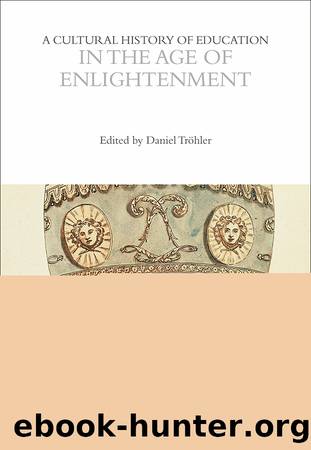A Cultural History of Education in the Age of Enlightenment by Daniel Trhler;

Author:Daniel Trhler;
Language: eng
Format: epub
Publisher: Bloomsbury UK
CHAPTER SIX
* * *
Teachers and Teaching
REBEKKA HORLACHER
As with most social practices, teaching is not an invention of the Age of Enlightenment1 but a ânaturalâ part of any transfer of knowledge and skills and therefore an anthropological âfact.â What makes teachers and teaching a privileged subject of research in the Age of Enlightenment is a particular shift in the meaning of teaching and a modified significance of being a teacher. The two termsâteachers and teachingâunderwent a shift as part of a larger movement labeled as the âeducationalization of social problems.â2 This concept addresses the belief that social problems can or actually should be solved through education; primarily through the education of the younger generation but also through the education of adults. All the undertaken attempts and actions corresponding to this shift counted either on the rationality of humans, concepts such as common sense, perfectibility, and individual improvement, or on the impact of aesthetics and emotion and appealed to morality. In the educationalization process, the teacher turned out to be the personification of these educational ambitions, and the pedagogical efforts to implement and guarantee these ambitions has since increased.3
This development is, for example, mirrored by the entry Lehrer (teacher) in the most comprehensive encyclopedia of eighteenth-century Germany, Johann Heinrich Zedlerâs Grosses vollständiges Universal-Lexicon Aller Wissenschafften und Künste (Great Complete Encyclopedia of All Sciences and Arts, 68 volumes, 1732â54), where the teacher is described as âsomeone who informs somebody about something he did not yet know.â4 By this definition, the task of the teacher is focused on the transmission of knowledge and information, but at the same time, both the school subjects and the teachers are equally morally shaped, as they can either be good or evil. Teaching is not restricted to the mind alone but also focuses on the body and the soul, because God gave different kinds of powers to humankind to be developed through education and teaching.5 To teach or to be taught requires both âskillsâ and âwill.â If one of these elements is missing, neither the teacher can teach nor can anyone be taught. Moreover, it must be guaranteed that the teacher teaches properly and makes the content to be taught comprehensible. This was termed Lehr-Art (style of teaching), pedagogy, or didactics.6 Teaching is therefore a demanding task, equally requiring content knowledge and didactic knowledge or pedagogy, and focuses on the âwhole person,â namely at the same time on its intellectual, physical, and psychical-moral powers. Besides this, Zedler distinguished between a teacher and a scholar or a man of letters. While the latter deals predominantly with the production or distribution of knowledge, the former cares primarily for the transmission of knowledge, and while this process was associated with a pedagogical meaning, it mirrored the âeducationalizationâ-shift of the discourse about teachers and teaching.
In Denis Diderotâs and Jean le Rond dâAlembertâs Encyclopédie, ou dictionnaire raisonné des sciences, des arts et des métiers (Encyclopedia, or a Systematic Dictionary of the Sciences, Arts, and Crafts, 35 volumes, 1751â80), by contrast, the entries on
Download
This site does not store any files on its server. We only index and link to content provided by other sites. Please contact the content providers to delete copyright contents if any and email us, we'll remove relevant links or contents immediately.
Kathy Andrews Collection by Kathy Andrews(11319)
The remains of the day by Kazuo Ishiguro(8378)
Paper Towns by Green John(4786)
Spare by Prince Harry The Duke of Sussex(4782)
Industrial Automation from Scratch: A hands-on guide to using sensors, actuators, PLCs, HMIs, and SCADA to automate industrial processes by Olushola Akande(4589)
The Body: A Guide for Occupants by Bill Bryson(4578)
Be in a Treehouse by Pete Nelson(3643)
Harry Potter and the Goblet Of Fire by J.K. Rowling(3604)
Machine Learning at Scale with H2O by Gregory Keys | David Whiting(3602)
Never by Ken Follett(3516)
Goodbye Paradise(3442)
The Remains of the Day by Kazuo Ishiguro(3131)
Into Thin Air by Jon Krakauer(3125)
The Cellar by Natasha Preston(3073)
The Genius of Japanese Carpentry by Azby Brown(3033)
Fairy Tale by Stephen King(2938)
Drawing Shortcuts: Developing Quick Drawing Skills Using Today's Technology by Leggitt Jim(2936)
120 Days of Sodom by Marquis de Sade(2935)
The Man Who Died Twice by Richard Osman(2801)
